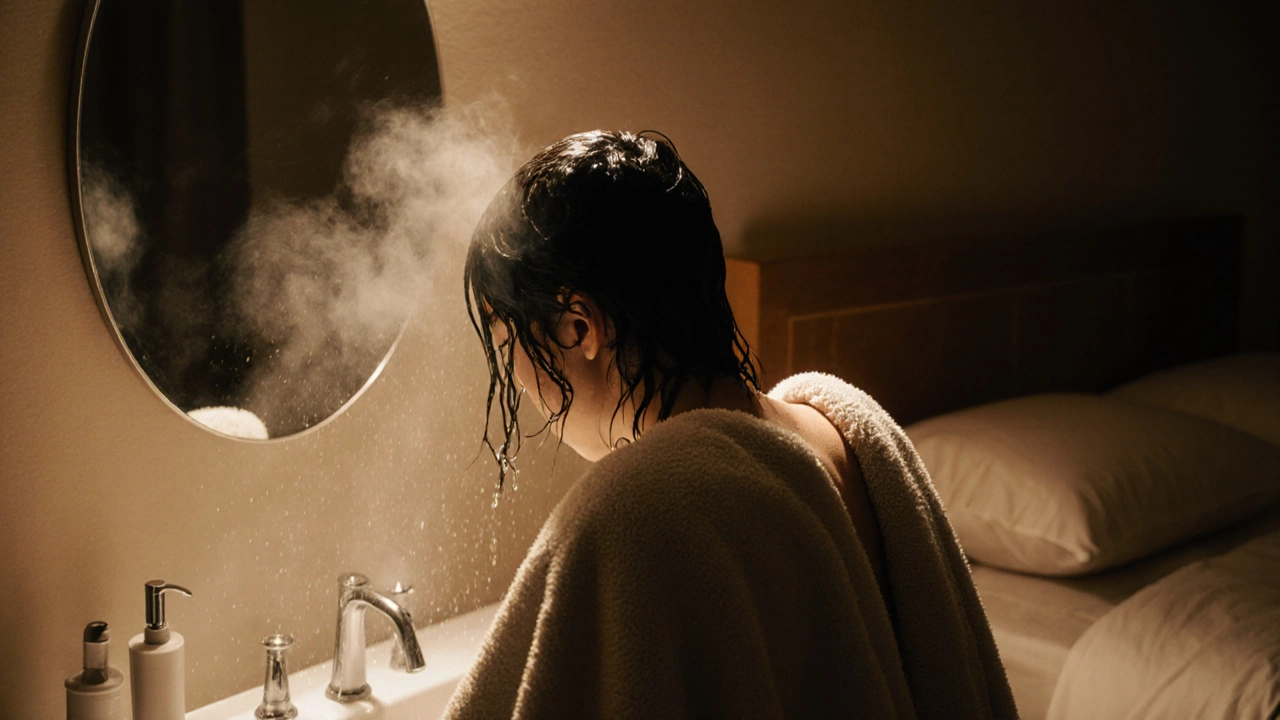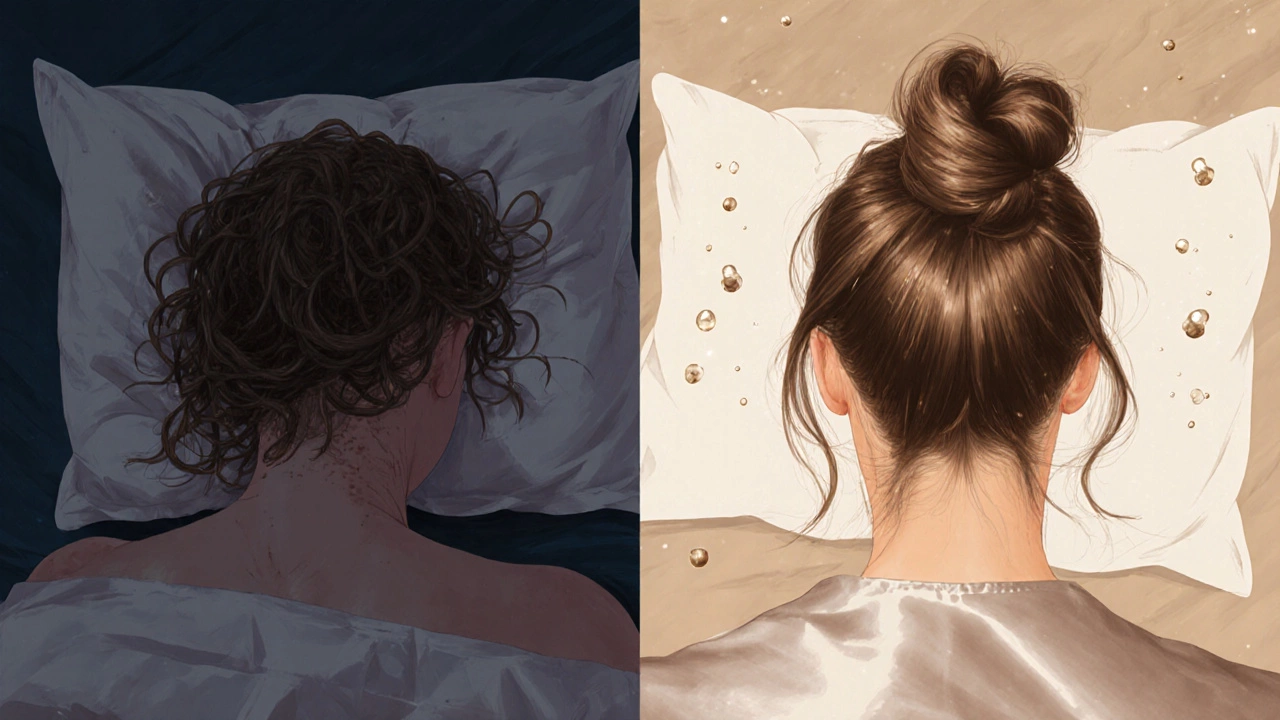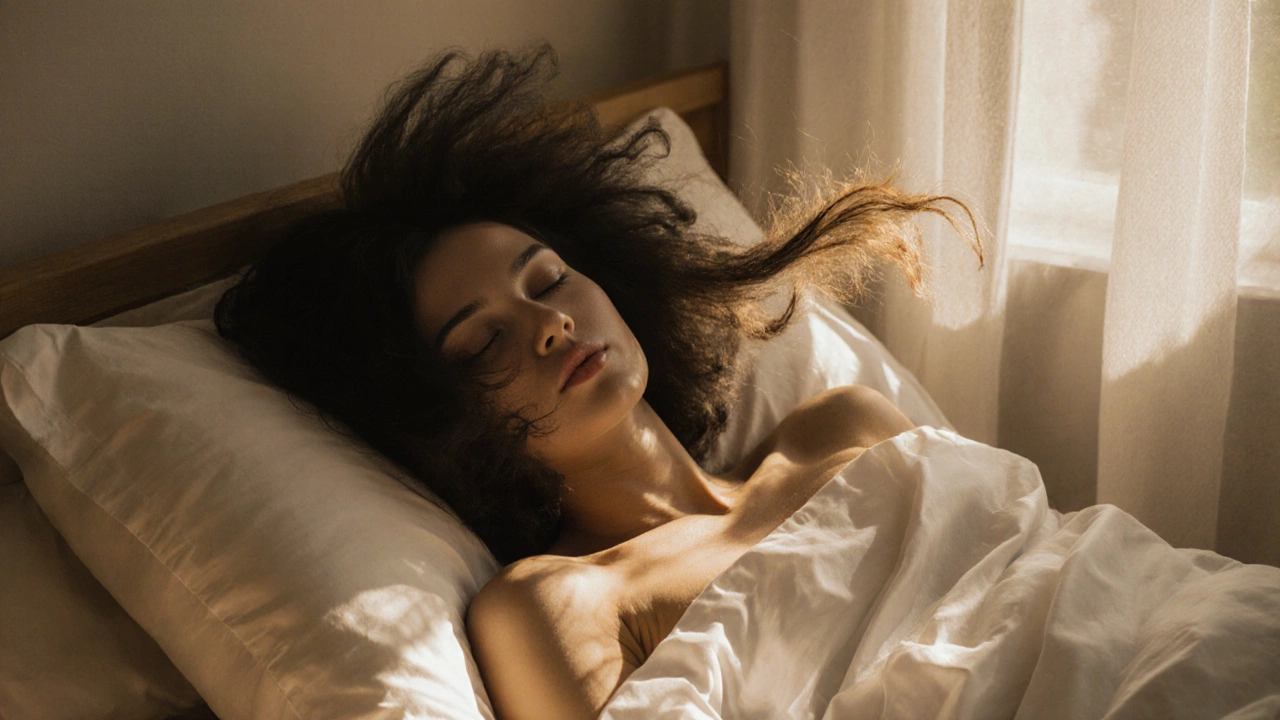
Hair Washing Time Calculator
Find Your Perfect Hair Washing Time
Answer a few quick questions about your hair and lifestyle to get personalized recommendations based on the latest science.
Results
Answer the questions above to see your personalized recommendation.
Ever stared at your shampoo bottle in the morning, wondering if you should just skip washing your hair today-or if you’d be better off doing it the night before? You’re not alone. Millions of people wrestle with this simple question: wash hair at night or in the morning? It seems like a tiny choice, but it actually affects your scalp health, hair texture, and even how long your style lasts. Let’s cut through the noise and look at what really happens when you wash your hair at different times of day.
What Happens to Your Hair While You Sleep?
Your scalp produces oil-sebum-every single night. That’s normal. It’s your body’s way of keeping your hair moisturized. But here’s the catch: if you go to bed with dirty hair, that oil, along with sweat, product buildup, and even dust from your pillowcase, sits on your scalp for 6-8 hours. That’s not just uncomfortable-it can clog follicles. A 2023 study from the Journal of Clinical and Aesthetic Dermatology found that overnight buildup increased scalp inflammation in 68% of participants who washed their hair only in the morning.
Think about your pillowcase. Cotton absorbs oil and dead skin cells. If you don’t wash your hair at night, you’re literally sleeping in a greasy layer you created during the day. That’s why people with fine or oily hair often wake up with flat, limp strands-even if they washed their hair the day before. Washing at night clears that buildup before it has time to settle in.
Why Morning Washes Can Backfire
Washing your hair in the morning sounds fresh, right? But think about what happens right after you rinse. Your hair is wet. Your scalp is exposed. And if you’re rushing out the door, you’re probably not waiting 45 minutes for it to air-dry. That means you’re either blasting it with heat from a blow dryer or leaving it damp all day.
Wet hair is fragile. The cuticle is raised, and the hair shaft is more prone to breakage. Constantly drying damp hair with heat-especially if you’re doing it daily-leads to split ends, frizz, and long-term damage. A 2024 survey by the International Society of Trichology found that people who washed their hair every morning and blow-dried it had 32% more breakage over six months than those who washed at night and let hair dry naturally.
Also, if you use styling products like gel, mousse, or serum in the morning, they sit on top of freshly washed hair. That means they’re not absorbing into the strands-they’re just sitting there, weighing your hair down and attracting dirt faster.
The Night-Wash Advantage: Less Heat, Better Results
Washing your hair at night gives it time to dry naturally. No blow dryer. No flat iron. Just air. That’s the secret to healthier hair. By the time you wake up, your scalp is clean, your strands are dry, and your hair is in its most resilient state.
Plus, if you’re someone who styles their hair daily-curls, straightening, braids-washing at night means your style lasts longer. Your hair has time to reset overnight. You wake up with natural volume, less frizz, and less need for product. People who wash at night often report needing 40% less styling product the next day.
There’s also a psychological benefit. A clean scalp before bed improves sleep quality. Studies show that reduced scalp irritation leads to fewer nighttime awakenings. If you’ve ever felt itchy or uncomfortable in bed because your hair felt greasy, you know what I mean.

Who Should Still Wash in the Morning?
Not everyone fits the night-wash mold. There are exceptions.
If you work out early and sweat heavily, washing in the morning makes sense. Sweat and salt can irritate the scalp if left on too long. Same goes for people with very curly or coily hair types-many find that morning washing helps them rehydrate and redefine curls after a night of friction against the pillow.
Also, if you use leave-in conditioners or scalp treatments that need to be applied to dry hair, morning washing gives you a clean slate. But even then, you can still wash at night and apply your treatment right after rinsing-just let it sit while you sleep.
The key isn’t rigid rules. It’s matching your routine to your hair type and lifestyle.
How to Wash Your Hair at Night Without Making a Mess
You don’t want to go to bed with dripping wet hair. That’s a recipe for damp pillows and cold nights. Here’s how to do it right:
- Wash your hair 2-3 hours before bed. That gives it time to air-dry partially.
- Use a microfiber towel or cotton T-shirt to gently squeeze out excess water. Don’t rub.
- Let your hair air-dry 70-80% before sleeping. You don’t need it bone-dry-just not dripping.
- Put your hair in a loose, high bun or pineapple (for curly hair) to avoid flattening.
- Switch to a silk or satin pillowcase. It reduces friction, prevents breakage, and doesn’t soak up as much oil.
That’s it. No extra tools. No expensive gadgets. Just smarter habits.

What About Hair Type?
Your hair texture changes everything.
- Oily hair: Wash at night. Daily buildup is your enemy. Night washing prevents greasiness by morning.
- Dry or curly hair: You can wash every 2-3 days. If you wash at night, use a light conditioner and let it sit overnight as a treatment.
- Thick or coarse hair: Night washing helps you avoid the heavy, weighed-down look you get from morning styling products.
- Color-treated hair: Wash at night to reduce UV exposure. Sunlight fades color faster. Plus, you’re less likely to use hot tools right after washing.
There’s no one-size-fits-all, but the pattern is clear: the more your hair is prone to damage or buildup, the better off you are washing at night.
The Bottom Line: Night Wins-Most of the Time
Washing your hair at night isn’t just a trend. It’s a practical, science-backed habit that reduces heat damage, prevents scalp issues, and saves you time in the morning. You’ll wake up with less frizz, more volume, and less need for styling products.
Yes, there are exceptions. If you sweat a lot, have very curly hair, or just prefer the ritual of morning washing, that’s fine. But if you’re looking to improve your hair’s health long-term, try switching to nighttime washing for two weeks. Track how your hair feels, how much product you use, and how often you feel the need to wash again.
Most people notice a difference in just a few days. Cleaner scalp. Less breakage. Better sleep. And honestly? Waking up with hair that doesn’t need fixing is the quiet luxury no one talks about.
Is it bad to sleep with wet hair?
Sleeping with soaking wet hair isn’t ideal. It can lead to fungal growth on the scalp, increased breakage from friction, and damp pillows that trap moisture. But if your hair is 70-80% dry, it’s perfectly fine. Just use a silk pillowcase and tie your hair in a loose bun.
How often should I wash my hair?
It depends on your hair type. Oily hair may need washing every day or every other day. Dry or curly hair usually does well with 2-3 times a week. Thick, coarse hair can go 4-5 days. The key is listening to your scalp-not following a calendar.
Does washing hair at night cause hair loss?
No. Washing your hair doesn’t cause hair loss. You might notice more strands in the drain because you’re removing hair that was already loose. That’s normal shedding-up to 100 hairs a day is typical. If you’re losing more than that consistently, see a dermatologist.
Should I use conditioner at night?
Yes-if your hair is dry or damaged. Apply conditioner after washing, then rinse it out before bed. For extra moisture, you can leave a lightweight leave-in conditioner on overnight. Just avoid heavy creams that can clog follicles.
What’s the best pillowcase for hair health?
Silk or satin pillowcases are best. They reduce friction, prevent breakage, and don’t absorb natural oils like cotton does. You don’t need to spend a fortune-look for 100% mulberry silk with a 19-22 momme weight for durability and softness.